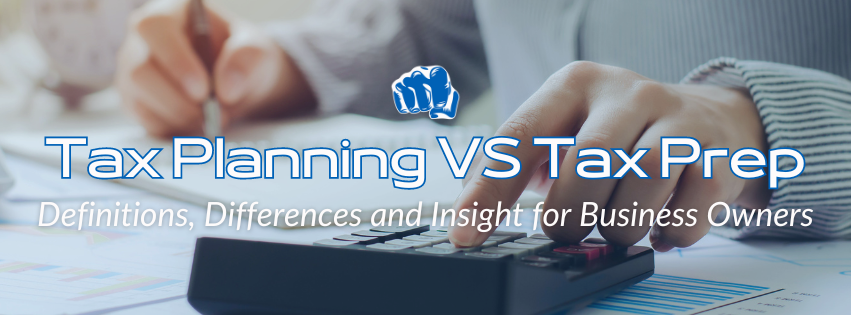What is Tax Planning and Tax Preparation?
As a business owner you’ve probably heard these terms before, but do you understand the differences between them? Both tax planning and preparation play significant roles to ensure you meet your tax obligations while minimizing your businesses liabilities. Here we’ll dive into the definitions of tax planning and tax preparation, highlighting their differences, and discussing why each is essential for effective financial management as a business owner.
Understanding Tax Planning
Tax planning is the strategic approach to reducing how much you pay in taxes while keeping more of your income. It means looking at your finances and making smart choices to lower your taxes now and in the future. The aim is not just to pay less tax, but also to follow the tax rules.
Key Aspects of Tax Planning
- Long-Term Strategy: Tax planning is not a one-time event; it’s an ongoing process that requires regular review and adjustment based on changes in income, expenses, or tax laws.
- Utilization of Deductions and Credits: Effective tax planning identifies available deductions and credits that can lower taxable income. This includes retirement contributions, educational expenses, and charitable donations.
- Investment Decisions: The timing of asset sales or purchases can significantly affect taxes owed. A well-structured investment strategy takes into account capital gains taxes and other implications.
- Retirement Planning: Contributions to retirement accounts can provide immediate tax benefits while securing future financial stability.
- Business Structure: For business owners, choosing the proper legal structure (LLC, S-Corp, etc.) can lead to substantial tax savings.
Understanding Tax Preparation
Tax preparation is the process of collecting your financial information and filing your annual income tax return to the IRS or state authorities. This usually happens once a year, where you report your income, deductions, credits, and other important details from the past year.
Key Aspects of Tax Preparation
- Documentation: Tax preparation requires meticulous documentation of all income sources (W-2s, 1099s), expenses (receipts), and other relevant financial records.
- Filing Returns: The primary goal of tax preparation is to accurately complete federal and state returns by deadlines to avoid paying penalties.
- Software or Professional Help: Many individuals use software programs for DIY preparation; others may hire professionals for more complex situations involving multiple income streams or business ownership.
- Reviewing Past Returns: Reviewing the previous years’ returns for any missed deductions or credits that could be claimed retroactively if applicable is beneficial.
- Post-Filing Actions: After filing returns, taxpayers should keep copies for their records in case of audits or future reference.
Key Differences Between Tax Planning and Tax Preparation

Conclusion
Having a better understanding of what the differences and roles are between tax planning and tax preparation will help prepare you with the tools necessary for effective financial management. While they are distinct processes—one being proactive (planning) and one reactive (preparation)—both are vital in ensuring compliance with regulations while minimizing liabilities effectively.
I hope this has given you a clearer understanding of the differences between tax planning and tax preparation, ultimately helping you make more informed financial decisions as a business owner and support your business’s growth.
Having a unified team managing both bookkeeping and accounting, like CORE Financial, offers significant benefits for busy business owners. With efficient communication, consistent record-keeping, and thorough financial management, CORE Financial ensures your health and wellness business’s financial records are accurate and current. Our approach not only saves you time and money but also provides personalized advice, enhanced tax preparation, and the flexibility to grow with your business.
Ready to get started? Contact us here.






